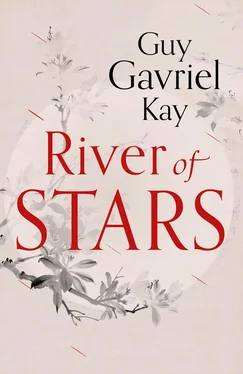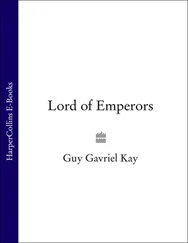Prime Minister Hang Dejin, his childhood tutor, his father’s and his own long-time adviser, was growing old. A melancholy, autumnal reflection. Another sorrow for the imperial heart. But it was also the way of life under heaven, as the Cho Master had taught them all. What man could avoid his end?
Well, there were ways to try. The emperor was following in another imperial tradition, taking a sequence of elixirs prepared for him each day by his occult masters of the Arcane Path. Kai Zhen had frequently and eloquently expressed his hope that these might prove efficacious.
There had also been sessions by candlelight wherein the leader of these same clerics (Kai Zhen had introduced him to the palace) invoked the spirit of Wenzong’s revered father to pronounce his approval of measures being undertaken for the governance of the realm, including the Genyue and the new music being devised for the performance of imperial rites.
Tuning the ritual instruments in a manner derived from the measured lengths of the middle, ring, and little fingers of the emperor’s left hand had been, the spirit of his father declared, a celestially harmonious idea.
Emperor Wenzong had taken this deeply to heart. He remembered being near to tears that night.
His own talents were not, truthfully, those of a man inclined to weigh matters of taxation and village administration, whether the army was made up of hired soldiers or a rural militia, how leaders were chosen in the countryside, or loans arranged for farmers—and repayment enforced.
He did pay attention to the examination questions for jinshi candidates, had even devised some of these himself. And he enjoyed presiding over the final testing days in his yellow robes of ceremony.
He’d been a painter and a calligrapher, from early in life. Noted for both, exalted for both, well before he’d taken the throne. He knew what he was, hadn’t ever pretended to be otherwise. He had wanted the Dragon Throne because it was there , and properly his, but his passions lay in another realm.
He had certainly done his duty as emperor. He’d fathered sons (many of them) and had them taught the ways of the Path and the Cho Master. He satisfied the imperial women, one each morning, two at night, according to the sequence presented to him by the Inner Quarters Registrar, dutifully denying himself a climax except (upon being advised) with the most innocent and youthful of his women. In this way, according to his arcane advisers, the female essence of his wives and concubines would bolster his essence, not drain it away.
This, too, was a burden and responsibility. His strength was the strength of Kitai. His virtue was the virtue of an empire.
He performed all the imperial rites, faithfully.
He’d returned to his father’s course of governance, after the unfortunate period when his mother ruled. Because it had been his father’s dream (as explained to him), he’d initiated war against the ungrateful Kislik in the northwest—and he did ask about it now and again. But it was important for an emperor to have trustworthy and diligent advisers so the imperial spirit could be allowed to flower and flourish … in the great garden of the world under nine heavens. Beyond all his duties, the emperor’s well-being, the soaring of his spirit, affected the well-being, the spirit of all Kitai.
Kai Zhen had put it that way just a few days ago in this very pavilion, which was Wenzong’s favourite now, with its view of the new rock-mountain.
The emperor intended to make Minister Kai a gift: a small painting he’d made here, a springtime landscape with flowering bamboo, an oriole, blue hills. The deputy prime minister had admired it, eloquently.
The emperor’s paintings were the most desired gift in Kitai.
It was a great shame, they had agreed, looking at it together, that Prime Minister Hang would not be able to see the details clearly any more. He was suffering the afflictions of age, Kai Zhen had suggested, in much the way autumn and winter succeed a brilliant spring. A garden like the Genyue could teach lessons like that.
This garden was—everyone said it—the heart-stopping wonder of the world. It was a mirror of Kitai in miniature, which was its purpose. Just as the emperor’s well-being and right behaviour were integral to preserving the mandate of heaven, so, too, it had been decided by his advisers, would an imperial garden designed to encompass the scope and balance of Kitai act to preserve that scope and balance.
It made so much sense.
His passion for this stupendous accomplishment wasn’t an affectation, an avoiding of tasks and cares. No. His labours here, his personal instructions to landscapers and architects, were at the heart—the very heart—of his duty to his people!
So the emperor of Kitai thought, sitting in an autumn pavilion in the sunlight of morning, with a view of his new mountain. He was contemplating making a painting, at ease in heart and mind, when he heard a strange sound from along the path where a gardener had moved out of sight sweeping leaves. The emperor looked at his guards. They stared straight ahead, expressionless. He heard the sound again.
The gardener was, if the emperor was not mistaken, crying.
PRIME MINISTER HANG DEJIN found the emperor, as expected, in the pavilion before the mountain. What he saw, however, was unexpected in the extreme. He thought, at first, that his weakened eyes were failing him again, but when he stepped carefully from his chair onto the groomed path, he realized they were not.
The emperor was standing at the edge of his pavilion. He was not writing, or painting, or gazing at his rock-mountain. He was looking down at a man prostrate on the path below him.
The man on the ground was trembling with terror. Given that he was—very obviously—a simple palace gardener (his rake lay beside him) in the actual, immediate presence of the emperor of Kitai, that fear was readily understood. The imperial guards had edged close. All were motionless, hands to swords, faces like stone warriors.
The emperor’s face was also cold, Dejin saw as he came near enough. It was not a customary expression for Wenzong. He could be demanding or inattentive, but seldom appeared angry. He did now.
Later, Hang Dejin would be caused to think (and even write a letter to an old friend) about how accidents of timing could have so great an impact on the way the world unfolded. You could decide this was the working of heaven, that such moments were not accidents at all, or you could see them as indicators of the limits placed by the gods on what mortal men could control, even if they were wise.
Dejin took the second view.
Had he not come looking for the emperor this morning with two letters in his robe, had the deputy prime minister been with Wenzong when the gardener was summoned into the imperial presence, significant matters would have proceeded otherwise than they did. He wrote that in his letter.
He made a formal obeisance. Emperor Wenzong had graciously stipulated that his senior councillors need not observe full court protocol when they were with him in his garden, but instinct suggested to Hang Dejin that this was a moment of importance and he offered all three prostrations. His mind was working quickly, however stiff his body was. He did not understand what had happened here and he needed to do so.
“Principal Councillor,” the emperor said, “we are pleased to see you. We would have sent for you to come to us. Approach.” Very formal, including the old title. There were meanings in everything, for those who knew how to find them.
“I am honoured to anticipate the emperor’s desire,” Dejin said, rising and coming forward. “Has something disturbed imperial tranquility?”
Of course something had, but it needed to be asked, to elicit a response—and a chance to sort this out.
Читать дальше












